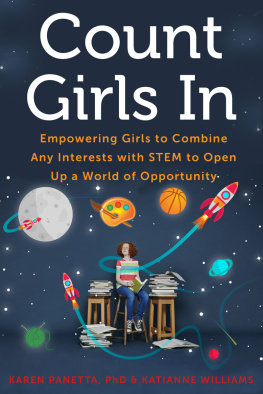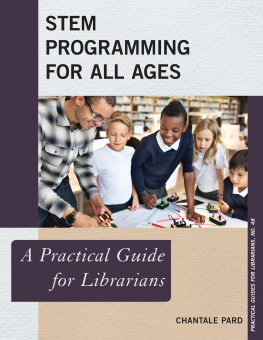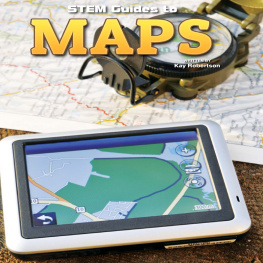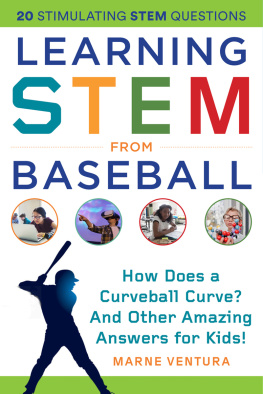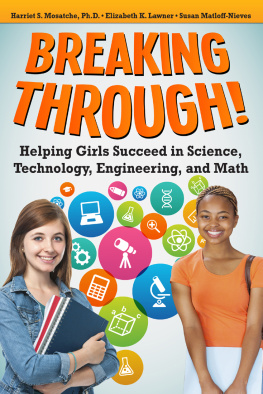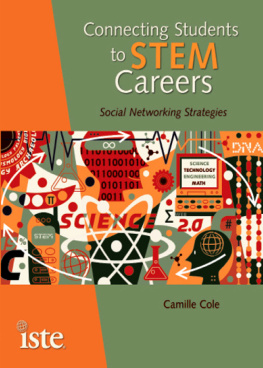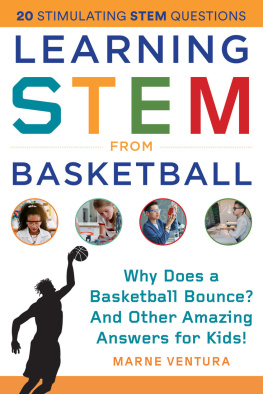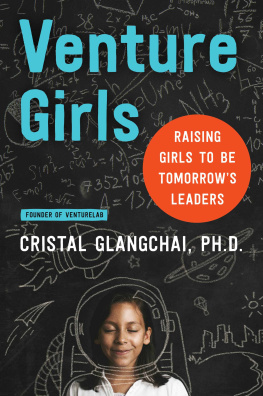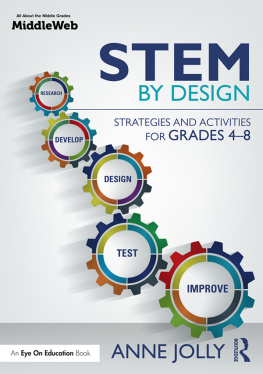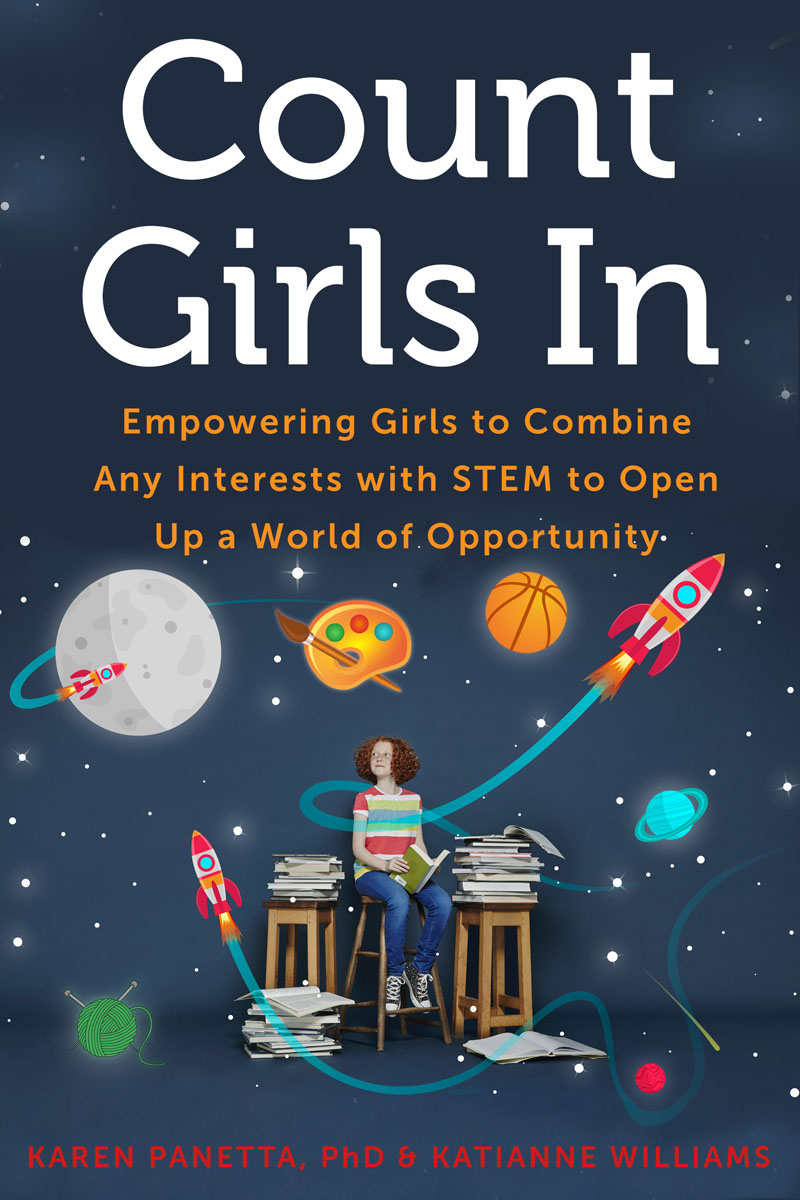
Copyright 2018 by Karen Panetta, PhD, and Katianne Williams
All rights reserved
First edition
Published by Chicago Review Press Incorporated
814 North Franklin Street
Chicago, Illinois 60610
ISBN 978-1-61373-939-6
Library of Congress Cataloging-in-Publication Data
Names: Panetta, Karen, author. | Williams, Katianne.
Title: Count girls in : empowering girls to combine any interests with STEM to open up a world of opportunity / Karen Panetta and Katianne Williams.
Description: First edition. | Chicago, Illinois : Chicago Review Press, 2018. | Includes bibliographical references and index. |
Identifiers: LCCN 2017052811 (print) | LCCN 2018006454 (ebook) | ISBN 9781613739402 (adobe pdf) | ISBN 9781613739419 (epub) | ISBN 9781613739426 (kindle) | ISBN 9781613739396 (paperback)
Subjects: LCSH: GirlsEducationUnited States. | Women in scienceUnited States | ScienceVocational guidance. | ScienceStudy and teachingUnited States. | TechnologyStudy and teachingUnited States. | EngineeringStudy and teachingUnited States. | MathematicsStudy and teachingUnited States. | BISAC: FAMILY & RELATIONSHIPS / Parenting / General. | FAMILY & RELATIONSHIPS / Education.
Classification: LCC LC1752 (ebook) | LCC LC1752 .P36 2018 (print) | DDC 507.1/073dc23
LC record available at https://lccn.loc.gov/2017052811
Cover design: Mumtaz Mustafa
Cover image: Flashpop/Stone/Getty Images
Interior design: Sarah Olson
Printed in the United States of America
5 4 3 2 1

To my unwavering sources of sustainable, renewable energy, and loves of my life, my husband, Jamie Allan Heller, and my son, Benjamin Jayden Heller
Karen
To Brian, Lucas, and Lily
Katianne
CONTENTS

AUTHORS NOTE

A s a professor at Tufts University back in 2000, Karen noticed that her female students were struggling with an identity crisis of sorts. They were limiting themselves. Instead of being comfortable and confident in who they were as female engineers, they were trying to blend into a predominantly male culture. Karen formed the nonprofit Nerd Girls Foundation to encourage college women in STEM to celebrate their authentic selves.
As a journalist, Katianne has spent years having conversations with women working in all areas of STEM. These smart, capable women have found success by using STEM to help them pursue their passions. STEM has become the tool that allows these women to work on issues that are extremely important to them personally. An electrical engineer joins the ground crew that sent a solar airplane around the world; a clinical molecular geneticist works with an interdisciplinary team to develop organs-on-chips that will advance the ways in which we study diseases; and a computer scientist warns individuals that our social media imprints tell others way more than we think they do. It is impossible to hear their stories, as well as the enthusiasm in their voices, and not be inspired.
We are both parents. Karen has a son, and Katianne has a son and a daughter. When we set out to collaborate on a book, we knew we wanted to reach other parents. Parents hold the key to raising children who celebrate individuality, appreciate peers for their perspectives and differences, have the confidence to pursue their own interests, and believe that all children, regardless of gender identity, can work and play together in all activities. In addition, a parents attitude toward STEM and toward diversity in STEM fields informs a childs beliefs, and positive experiences at home will counter exposure to negative stereotypes outside the home.
While todays kids have greater access to STEM activities than ever, there is still an opportunity gap. Those children who live in affluent school districts or attend private schools, who can afford to attend expensive courses and summer camps, who are at the top of their class, and who have parents who are already engaged in STEM have access to opportunities that other children may not. Sometimes, hearing about these activities that may not be available to ones own kids can make parents feel that the STEM door is already closed to their children. We hope that this book shows parents that this is not true. We believe that all parents can take steps at home to keep that door wide open, and that building a positive STEM attitude is the number-one way to achieve this.
Finally, we didnt write this book to tell parents how to maximize test scores or get their children into elite universities. We want to help parents raise authentic young women who have the confidence to put STEM to work in a way that best serves them and their passions. We believe in educating the whole child. We can all work together to raise children who appreciate science, believe in themselves, applaud the contributions of others, reach for the stars, and maybe change the world in the process.
PART I

What We Want for Our Girls
Once we believe in ourselves, we can risk curiosity, wonder, spontaneous delight, or any experience that reveals the human spirit. E. E. Cummings
Maintain the Awesomeness
L ittle girls start out so full of spirit, joyously and chaotically marching to their own drums. They dance, they sing, they dress themselves in whatever smorgasbord of clothing makes them happy. Each day when they rise, they are ready to take the world by storm. They are interested in what everything is and how everything works. Their favorite question is why. They can be loud, they know what they want, and they are going to be presidents, astronauts, doctors, scientists, or butterflies. These girls are chock-full of awesomeness.
And yet, as the years pass, many girls lose their natural inquisitiveness, their enthusiasm, and even their confidence. Sometimes they lose their authenticity and put aside their passions in order to fit in. In the classroom, teachers see many girls begin to drift away from STEM subjectsscience, technology, engineering, and math.
The reasons girls turn away from STEM are as varied and complex as girls themselves. Obstacles crop up in elementary school, middle school, high school, and even in college and beyond.
Some girls dont feel smart enough. Maybe they missed a key math concept in elementary school and were never able to catch up. Or they failed a test in middle school and their confidence plummeted. Or they were told by a teacher, parent, or peer that they werent capable. Its not unusual for a girl to truly excel in math and science, to be one of the smartest in her class, and yet still doubt her ability.
Some girls look at the world and see confirmation that boys are made for math and science while girls arent. They may think they see proof of this in the behaviors of their own parents, grandparents, or teachers. A girl may have heard her own mother say shes bad at math or had female teachers who show math anxiety or heard a trusted adult claim a girl should behave a certain way. Some girls, particularly at the high school or college level, encounter biased teachers. In fact, some girls have been led to believe that their math and science ability is innate and unchangeableso whats the point of trying to be better?

